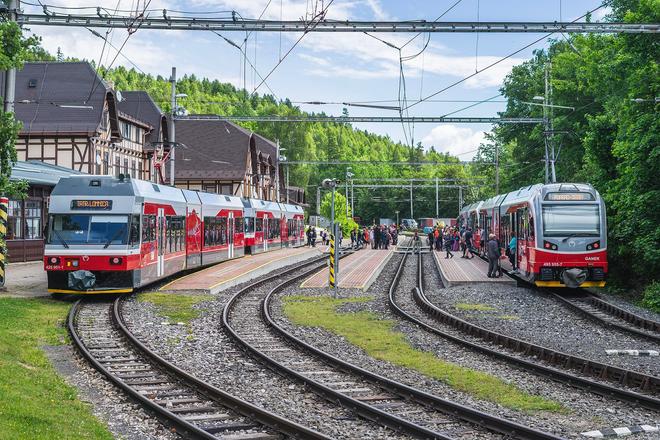From 1 August 2025, rail passengers eligible for free travel will no longer be required to obtain a zero-fare ticket before boarding regional trains, in a move aimed at cutting bureaucracy and making public transport more accessible.
The change, announced by state rail operator Železničná spoločnosť Slovensko (ZSSK), will allow passengers to board with only a valid ZSSK discount card, removing the need to queue for a paper ticket – even when no fare is payable.
Initially intended for senior citizens, the policy has since been expanded to cover a broader range of passengers, including students, school pupils, children under 16, and younger pension recipients. The change applies to regional services classified as Os, REX and Zr, but does not affect long-distance trains such as Express (Ex), Rapid (R) or EuroCity (EC), where zero-fare tickets must still be collected in advance.
ZSSK said the reform would save time, ease pressure on station staff, and streamline the travel experience. “This is about removing unnecessary steps for those who travel with us frequently and rely on fare discounts,” the operator said in a statement.
In a further step towards digitalisation, ZSSK will launch an electronic version of its discount card in September 2025 via its mobile app, IDeme vlakom. The digital card will feature a scannable QR code, although the traditional plastic version will remain valid. The move is being promoted as a more sustainable and convenient alternative to ticket office visits.
These changes form part of a broader overhaul of Slovakia’s regional rail network, including the expansion of its self-service dispatch system (SVS). The SVS model – already operating on 19 lines – removes the need for conductors on board, requiring passengers to have a valid pre-purchased ticket before boarding. The system follows similar models used in Austria, Germany, the Czech Republic and Switzerland.
Crucially, those eligible for 100 percent fare discounts will remain exempt from the pre-ticket requirement under SVS. Their ZSSK-issued card will continue to serve as a valid proof of travel – a change now extended across all eligible regional trains.
Peter Helexa, ZSSK’s chief executive, described the reform as a move towards “clear and fair rules that apply to everyone – just as they do in modern public transport systems across Europe.” He added that this was not a temporary measure, but a systematic step towards a more efficient, trust-based transport model.
Expansion of self-service operations
From August, the SVS system will be extended to several additional routes, including:
Žilina – Púchov – Trenčín-Zlatovce (Os trains)
Skalité – Čadca – Žilina – Liptovský Hrádok (Os trains)
Prievidza – Horná Štubňa – Vrútky (Os trains)
Zvolen – Banská Bystrica – Brezno (all Os and Zr trains)
On these lines, tickets must be purchased in advance via the IDeme vlakom app, by SMS, or at a station. Random inspections will be carried out by specially trained transport controllers. Passengers caught travelling without a valid ticket face fines ranging from €40 (paid on the spot) to €70 (if paid later), plus the cost of the fare.
The expansion of SVS is being enabled by an increasing number of modern electric and diesel train units capable of safe, conductor-free operation. However, ZSSK has stressed that conductors will remain on routes where infrastructure or operational complexity demands it.
Impact on staff and future plans
The shift towards automation will have staffing implications, with some conductors reassigned to other routes or retrained as ticket inspectors. While some roles will be phased out, ZSSK has pledged support for affected employees, including redeployment assistance via partner organisations.
Looking ahead, ZSSK is also developing a mobile-based check-in/check-out system, similar to those in cities such as Berlin and Zurich. The app will allow passengers to register their journey with a single tap, and will automatically calculate the best available fare – eliminating the need for conventional ticketing.
Martin Bahurinský, deputy chair of ZSSK, said: “Just as no one boards a tram in Bratislava without a valid ticket, the same standard must apply to rail. Clear rules are the foundation of a fair and reliable public transport system.”
ZSSK’s modernisation programme – underpinned by digital innovation, operational efficiency and customer service – is backed by Slovakia’s Transport Ministry and aligns with the country’s broader strategy for building a sustainable, user-friendly rail network.
Digital shift gains momentum
Digital ticketing has seen a surge in popularity in Slovakia. The share of tickets sold through digital channels has jumped from just under 5 percent in 2020 to more than 56 percent in 2025, with the mobile app alone accounting for over 40 percent of sales.
The number of free-fare seats has also risen, particularly on the busy Košice–Žilina–Bratislava corridor, where additional express services have increased capacity for eligible passengers by 30 percent.


 From 1 August 2025, rail passengers in Slovakia eligible for free travel will no longer be required to obtain a zero-fare ticket before boarding regional trains. (source: ZSSK)
From 1 August 2025, rail passengers in Slovakia eligible for free travel will no longer be required to obtain a zero-fare ticket before boarding regional trains. (source: ZSSK)